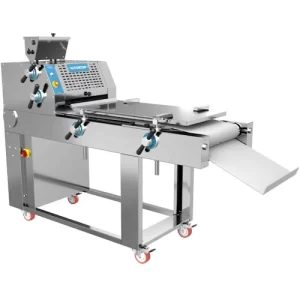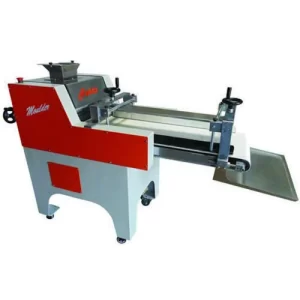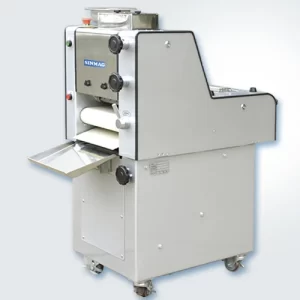Subtotal: ₹208,353.50
Flour Kneading Machines
-
Dough Moulder Machine, 300Kg
Capacity 300KgDesign Type StandardMachine Body Material Stainless Steel₹150,000.00Dough Moulder Machine, 300Kg
₹150,000.00 -
Semi-Automatic Dough Moulder
Motor Power 500 WattsWeight 255 KgsUsage/Application Toast & Bread Moulder Machine₹246,966.00Semi-Automatic Dough Moulder
₹246,966.00 -
Automatic 0.5 Hp Mini Dough Moulder Machine
Motor Power 0.5 HPWeight 1500 kgUsage/Application Industrial₹190,000.00Automatic 0.5 Hp Mini Dough Moulder Machine
₹190,000.00 -
Automatic Bread Moulder, 0.75
Power(KW) 0.75Weight (Kilogram) 220Model No. SM-307Roller Gap Adjustment 1-25 mm₹372,000.00Automatic Bread Moulder, 0.75
₹372,000.00
Flour Kneading Machines: A Comprehensive Guide to Features, Benefits, and Selection Criteria
Introduction to Flour Kneading Machines
Flour kneading machines have become an essential component in both commercial and household kitchens. These machines streamline the process of mixing and kneading dough, ensuring consistency and efficiency. Whether used in bakeries, restaurants, or homes, a good flour kneading machine significantly reduces manual labor and improves dough quality.
In this guide, we will explore different types of flour kneading machines, their benefits, key factors to consider when purchasing, and maintenance tips to ensure long-term performance and reliability.
Types of Flour Kneading Machines
1. Domestic Flour Kneading Machines
These machines are compact and designed for household use. They typically have smaller capacities and are easy to use.
- Stand Mixers with Dough Hooks: Ideal for small batches of dough.
- Automatic Dough Makers: Feature preset programs for different types of dough.
- Mini Dough Kneaders: Suitable for small families and occasional baking.
2. Commercial Flour Kneading Machines
Designed for high-volume production, these machines are used in bakeries, pizzerias, and large-scale food production.
- Spiral Mixers: Provide efficient dough mixing for bakeries and pizzerias.
- Planetary Mixers: Versatile and used for mixing various ingredients, including dough.
- Horizontal Dough Kneaders: Suitable for large-scale dough production.
3. Industrial Flour Kneading Machines
These machines cater to large-scale production and industrial food processing units.
- Continuous Dough Kneading Systems: Used in factories for mass production.
- Double Arm Mixers: Ensure thorough mixing for large batches.
- Vacuum Dough Kneaders: Improve dough texture and consistency.
Benefits of Flour Kneading Machines
1. Time-Saving Efficiency
Automated kneading machines significantly reduce the time required to prepare dough.
2. Consistent Dough Quality
Machines ensure uniform mixing, resulting in better texture and consistency.
3. Reduced Manual Labor
Minimizes the physical effort required, making it ideal for commercial setups.
4. Improved Hygiene and Cleanliness
Enclosed designs prevent contamination, ensuring food safety.
5. Multiple Dough Options
Different settings allow for kneading various types of dough, including bread, pizza, and pastry dough.
6. Energy and Cost Efficiency
Advanced models consume less energy while maximizing output.
Factors to Consider When Buying a Flour Kneading Machine
1. Capacity and Size
Choose a model based on your dough production requirements.
2. Power Consumption
Opt for energy-efficient machines that balance power usage and performance.
3. Material and Durability
Stainless steel construction ensures longevity and hygiene.
4. Ease of Use and Maintenance
Look for user-friendly controls and easy-to-clean designs.
5. Brand Reputation and Warranty
Select machines from trusted manufacturers with reliable customer support.
6. Budget Considerations
Compare pricing based on features and long-term operational costs.
Maintenance Tips for Flour Kneading Machines
1. Regular Cleaning
Prevent dough buildup and bacteria growth by cleaning the machine after each use.
2. Lubrication and Maintenance
Keep moving parts well-lubricated to avoid mechanical wear.
3. Check Electrical Components
Inspect wiring and connections to prevent electrical hazards.
4. Follow Manufacturer Guidelines
Adhere to recommended maintenance schedules for optimal performance.
5. Avoid Overloading
Using the machine beyond its capacity can reduce efficiency and lifespan.
Conclusion
Flour kneading machines enhance the efficiency of dough preparation for homes, bakeries, and industries. By selecting the right model and ensuring proper maintenance, users can enjoy consistent dough quality, reduced labor, and long-term cost savings. Investing in a high-quality flour kneading machine can transform the baking experience, making it easier, faster, and more convenient.









